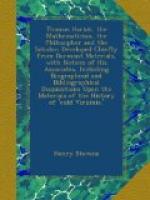Raleigh’s Patent, like that of Gilbert, would have expired by the limitation of six years on the 24th of March 1590 if he had not succeeded in leading out a colony and taking possession. His first colony of 1585 was voluntarily abandoned, but not his discoveries. His second colony of 1587 was surrounded with so much obscurity that though in fact he maintained no real and permanent settlement, yet it was never denied that he lawfully took possession and inhabited Virginia within the six years and also for a time in the seventh year, and therefore was entitled to privileges extending two hundred leagues from Roanoke. As long as Elizabeth lived no one disputed Raleigh’s privileges under his patent, though partly assigned, but none of the Assignees cared to adventure further. The patent had become practically a dead letter. As late however as 1603 the compliment was paid Raleigh of asking his permission to make a voyage to North Virginia. As no English plantation between the Spanish and the French possessions in North America at the time of the accession of James was maintained the patent was allowed nominally to remain in force. But no one claimed any rights under it. It has been stated by several recent historians that the attainder of Raleigh took away his patent privileges, but evidence of this is not forthcoming. It is manifest that James the First, who had little regard for his own or others’ royal grants or chartered rights in America, considered the coast clear and as open to his own royal bounty as it had been long before to Pope Alexander the Sixth. It was easier and safer to obtain new charters than to revive any questionable old ones.
But to all intents and purposes the interesting history of Virginia begins with Raleigh. Whence he drew his inspiration, how he profited by the experience of others, how he patronized his Magi and bound them to himself with cords of friendship and liberality; how by his very blunders and misfortunes he transmitted to posterity some of the most precious historical memorials found on the pages of English or American history, we have, perhaps at unnecessary length, endeavoured to show in this long essay on the brief and true Report of Thomas Hariot, his surveyor and topographer in Virginia, which must ever serve as the corner-stone of English American History, by a man who, though long neglected and half forgotten, must eventually shine as the morning star of the mathematical sciences in England, as well as that of the history of her Empire in the West.
It remains now to give some personal account of Thomas Hariot, whose first book as the first of the labors of the hercules club has been reproduced. Every incident in the life of a man of eminent genius and originality in any country is a lesson to the world’s posterity deserving careful record. Hitherto dear quaint old positive antiquarianly slippery Anthony à Wood in his Athenes Oxoniensis embodies nearly all of our accepted notions of this great English




